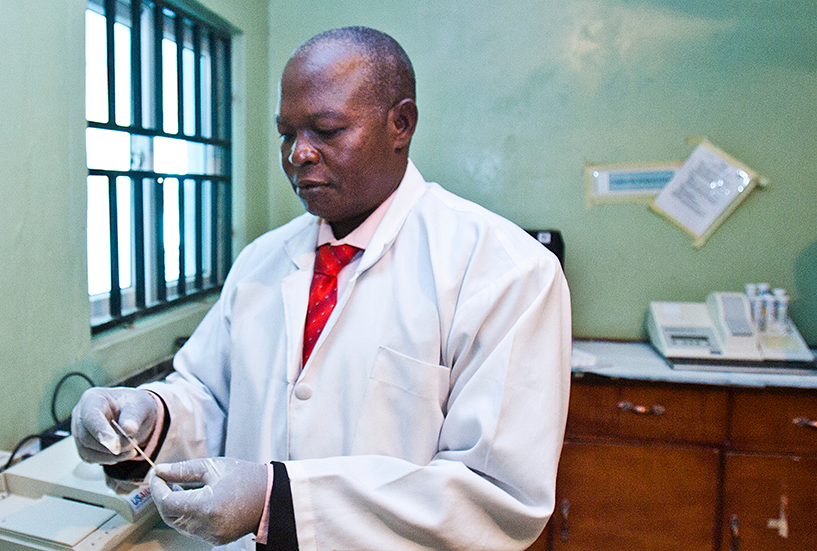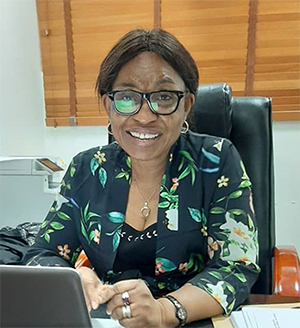Nigeria’s response to COVID-19: How unity of purpose can combat our common enemy
Nigeria’s response to COVID-19: How unity of purpose can combat our common enemy
by Hussain Ibrahim


Nwando Mba is the Director of Public Health Laboratory Services at the Nigeria Centre for Disease Control (NCDC), a sub-recipient to the Resilient and Sustainable Systems for Health (RSSH) project, funded by the Global Fund and managed by MSH. A medical laboratory scientist by profession, Mba started her career over 30 years ago in Nigeria’s Vaccine Production Laboratory at Yaba, Lagos. Mba discusses Nigeria’s efforts to increase the country’s testing capacity for coronavirus.
What does your typical day look like right now at the NCDC?
Hectic, I would say! The NCDC leads Nigeria’s response to the COVID-19, as well as the diagnosis. In times of peace—when there is no active outbreak—I start working around 5 am, but now, during an active outbreak of COVID-19? I have no start nor end of my day. We are open 24/7, and my phone is never switched off. For the last three months, I have led the rapid establishment and activation of more molecular laboratories for COVID-19 testing.
The laboratory aspect of the response has been a major challenge and focus for the country, with important decisions and compromises to be made daily. As the Director of Public Health Laboratory Services, coordination responsibility falls on me, under the leadership of the Director General. From early morning on, I receive calls from response partners, members of my staff who need emergency guidance or quick approval, colleagues from other departments, and those requiring information on relief support. I spend my day providing coordination—holding meetings, troubleshooting issues—to all the laboratory unit heads and other labs in the network, providing updates to the Director general, the Presidential Task Force, and other partners and making sure everything runs and works as expected.
What differences do you observe in Nigeria’s response to COVID-19 versus the Ebola outbreak in 2014?
We are better prepared now compared to the period of Ebola. Why? Then, we had only two laboratories that could diagnose Ebola, and we still had to send our test samples outside for confirmation, to Dakar and to Germany. But when COVID-19 started, we leveraged our already existing network of viral haemorrhagic testing labs (six labs), which the NCDC had put in place to start diagnosis and to confirm results, without having to send anything out. As of today, we have 25 active laboratories running at full testing capacity in Nigeria. And many more private entities, as well as state governments, are interested in setting up testing centers in their states. This did not happen during the Ebola outbreak.
How are states prepared to address testing for coronavirus? What is the current testing situation across the country?
The states are well prepared and aligning themselves with the national strategy. Most of them have reached out to us for support. Once we know what they have on the ground, we can tell them what is missing and upgrade them for testing. So, in a way, the states’ preparedness has met the national strategy “in the middle,” which is why we have the current level of success we have. Presently, 18 of our 36 states in the federation are testing at full capacity, while a few more are in the pipeline to be set up for testing in the next few weeks. Other states are coming up to full testing before the week runs out. The next phase is to activate all PCR machines [polymerase chain reaction, a crucial tool in molecular applications], which are present in all 36 states for testing.
What is the biggest challenge facing Nigeria, as it continues to address this emerging situation?
Unity. We need unity of purpose to combat our common enemy: coronavirus. Everyone has a role to play—the government, the community, the entire population. The government can play its own role, but if people do not cooperate, the efforts of the government will go unseen. And vice versa. If people play their own role and the government fails to do theirs, then the support and the sacrifices we make will not be fruitful. But if we can all come together as one, and play our individual roles, then we will successfully overcome this pandemic, and in less time.
Where would you say donor support has been most effective in enabling the NCDC to meet their current challenges during the pandemic? What kind of support will be effective as we continue to experience the effects of COVID-19?
Donor support has made an immense impact on the response. Donors using their areas of expertise to facilitate sourcing of testing reagents and equipment, technical support in planning and implementation, human resources, funding support—even transport logistics from private partners—have all been effective in enabling the NCDC lab network to overcome the challenges we confront on a daily basis. And such continuous support will most certainly allow us to control the pandemic.
What gives you hope?
Humans are still wiser than microbes. Once in a while, during outbreaks, microbes have a way of making humans look foolish. It is only temporary. And this is what gives me hope. It will pass and end soon. You know the popular saying, “We can work together if we agree to do so”? It is one of the lessons I have learned through COVID-19. The collaboration of all concerned—the government, private organizations, private individuals, the community, the general public—has gone a long way in providing the success we have recorded so far. It has helped immensely, and it further reinforces the need for unity. I am sure the lessons we have learned will help each of us play our part to put the necessary structures and systems in place against the next outbreak.